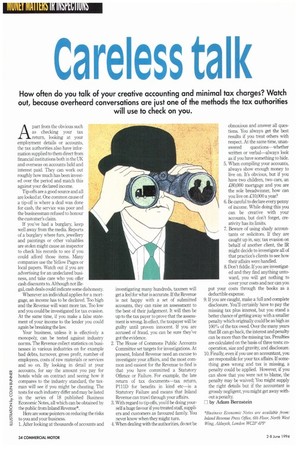Careless talk
Page 36

If you've noticed an error in this article please click here to report it so we can fix it.
How often do you talk of your creative accounting and minimal tax charges? Watch out, because overheard conversations are just one of the methods the tax authorities will use to check on you.
Apart from the obvious such as checking your tax return, looking at your employment details or accounts, the tax authorities also have information supplied to them direct from financial institutions both in the UK and overseas on accounts held and interest paid. They can work out roughly how much has been invested over the period and match this against your declared income.
Tip-offs are a good source and all are looked at. One common cause of a tip-off is where a deal was done for cash, the service was poor and the businessman refused to honour the customer's claim.
If you've had a burglary, keep well away from the media. Reports of a burglary where furs, jewellery and paintings or other valuables are stolen might cause an inspector to check his records to see if you could afford those items. Many companies use the Yellow Pages or local papers. Watch out if you are advertising for an undeclared business, and take care who you offer cash discounts to. Although not illegal, cash deals could indicate some dishonesty Whenever an individual applies for a mortgage, an income has to be declared. Too high and the Revenue will want more tax. Too low and you could be investigated for tax evasion. At the same time, if you make a false statement of your income to the lender you could again be breaking the law.
Your business, unless it is effectively a monopoly, can be tested against industry norms. The Revenue collect statistics on businesses in various industries on for example bad debts, turnover, gross profit, number of employees, costs of raw materials or services and so on. By looking in detail at your accounts, for say the amount you pay for hotels while on contract and seeing how it compares to the industry standard, the taxman will see if you might be cheating. The tests for each industry differ and may be listed in the series of 18 published Business Economic Notes, all which can be obtained by the public from Inland Revenue*.
Here are some pointers on reducing the risks to you and your business.
1. After looking at thousands of accounts and investigating many hundreds, taxmen will get a feel for what is accurate. If the Revenue is not happy with a set of submitted accounts, they can raise an assessment to the best of their judgement. It will then be up to the tax payer to prove that the assessment is wrong In effect, the taxpayer will be guilty until proven innocent. If you are accused of fraud, you can be sure they've got the evidence.
2. The House of Commons Public Accounts Committee set targets for investigations. At present, Inland Revenue need an excuse to investigate your affairs, and the most common and easiest for the Revenue to find is that you have committed a Statutory Offence or Failure. For example, the late return of tax documents—tax return, P111D for benefits in kind etc—is a Statutory Failure and means that Inland Revenue can trawl through your affairs.
3. With regard to tip-offs, you'd be doing yourself a huge favour if you treated staff, suppliers and customers as favoured family. You never know when they might turn.
4. When dealing with the authorities, do not be obnoxious and answer all questions. You always get the best results if you treat others with respect. At the same time, unan swered questions—whether written or verbal—always look as if you have something to hide.
5. When compiling your accounts, always show enough money to live on. It's obvious, but if you have two children, two cars, an £80,000 mortgage and you are the sole breadwinner, how can you live on £10,000 a year?
6. Be careful to declare every penny of income. While doing this you can be creative with your accounts, but don't forget, creativity has its limits.
7. Beware of using shady accountants or solicitors. If they are caught up in, say, tax evasion on behalf of another client, the IR might decide to investigate all of that practice's clients to see how their affairs were handled.
8. Don't fiddle. If you are investigated and they find anything untoward, you will get nothing to cover your costs and nor can you put your costs through the books as a deductible expense.
9. If you are caught, make a full and complete disclosure. You'll certainly have to pay the missing tax plus interest, but you stand a better chance of getting away with a smaller penalty which originally could be as high as 100% of the tax owed. Over the many years that IR can go back, the interest and penalty can be more than the missing tax. Penalties are calculated on the basis of three tests: cooperation, size and gravity, and disclosure.
10. Finally, even if you use an accountant, you are responsible for your tax affairs. If something goes wrong and tax is missing, a penalty could be applied. However, if you can show that you were not to blame, the penalty may be waived; You might supply the right details but if the accountant is grossly negligent, you might get away without a penalty.
D by Adam Bernstein
















































































